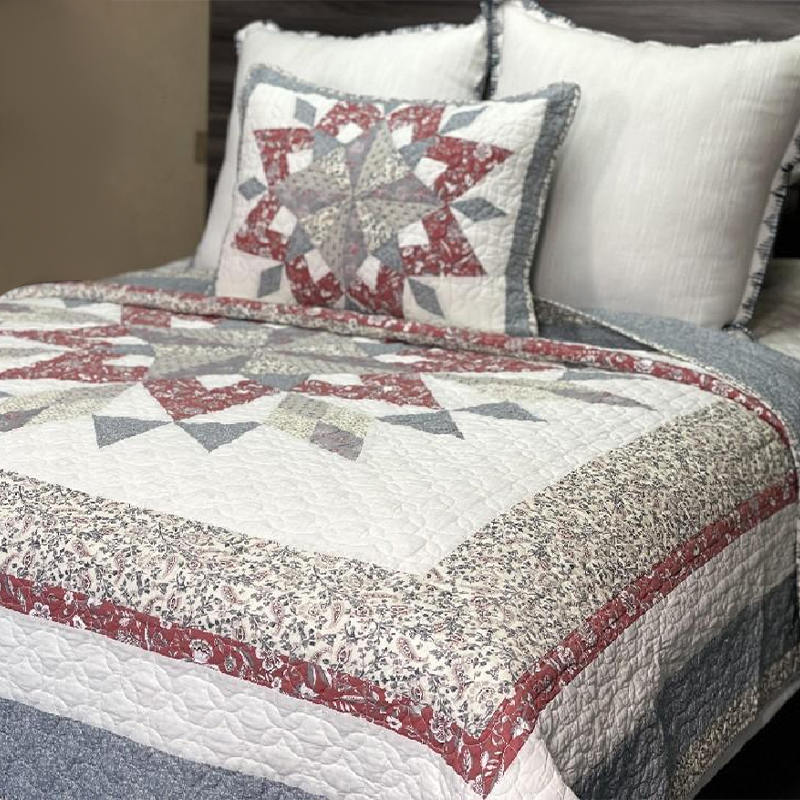Product Consultation
Your email address will not be published. Required fields are marked *

In today’s market, bedding choices abound, but discerning consumers increasingly prioritize quality, sustainability, and long-term value. When selecting a comforter set, the debate between natural cotton and synthetic fabrics is pivotal. Cotton embroidered comforter sets, in particular, stand out as a superior choice for health-conscious, eco-aware, and comfort-driven households.
1. Breathability and Temperature Regulation
Cotton’s natural fiber structure allows air to circulate freely, wicking moisture away from the body and preventing heat buildup. This makes cotton embroidered bedding ideal for year-round use—cool in summer and insulating in winter. Synthetic materials like polyester, while lightweight, often trap heat and moisture, leading to discomfort during sleep.
Key Benefit: Enhanced sleep quality through adaptive thermal regulation.
2. Hypoallergenic and Skin-Friendly
Pure cotton is naturally hypoallergenic and free from harsh chemicals found in synthetic textiles. Polyester and microfiber blends are typically treated with formaldehyde, dyes, and plasticizers to improve durability—substances linked to skin irritation and respiratory issues. Cotton’s organic origin minimizes allergic reactions, making it a safe choice for sensitive skin or asthma sufferers. Dermatologists frequently recommend cotton bedding for patients with eczema or psoriasis.
Key Benefit: Reduced exposure to irritants and healthier skin.
3. Durability and Long-Term Value
High-quality cotton, such as Egyptian or Supima varieties, boasts long-staple fibers that resist pilling and fraying. When embroidered with precision, cotton fabrics maintain their structural integrity even after repeated washing. Synthetic options, though cheaper upfront, degrade faster—losing shape, color vibrancy, and softness within months. A Consumer Reports analysis found that cotton bedding lasts 2–3 times longer than polyester equivalents, offering better cost-per-use value.
Key Benefit: A one-time investment that pays off in longevity.
4. Sustainability and Environmental Impact
Cotton is biodegradable and renewable, decomposing naturally without releasing microplastics into ecosystems. Synthetic fabrics, derived from petroleum, contribute to 35% of global microplastic pollution in oceans (per the International Union for Conservation of Nature). Moreover, organic cotton farming uses 71% less water and 62% less energy than conventional methods (data from the Textile Exchange). By choosing cotton embroidered bedding, you support circular economies and reduce your carbon footprint.
Key Benefit: Eco-conscious living without compromising luxury.
5. Aesthetic and Tactile Appeal
Embroidery elevates cotton’s inherent elegance. Hand-stitched or machine-embroidered patterns on cotton add a timeless, artisanal touch that synthetic fabrics struggle to replicate. Polyester embroidery often appears stiff or overly glossy, whereas cotton’s matte finish and natural drape create a refined, inviting aesthetic. Additionally, cotton softens with each wash, developing a lived-in comfort that synthetics cannot match.
Key Benefit: Aesthetic versatility paired with enduring softness.
Cotton embroidered comforter sets are not merely bedding—they are an investment in health, sustainability, and daily comfort. While synthetic options may tempt with lower prices, their hidden costs—environmental harm, reduced durability, and health risks—outweigh short-term savings.
Your email address will not be published. Required fields are marked *
Whether you want to become our partner or need our professional guidance or support in product selections and problem solutions, our experts are always ready to help within 12 hours globally.

Copyright © Nantong Jinxin Arts & Crafts Co., Ltd. All Rights Reserved.China Bed linings Manufacturers
